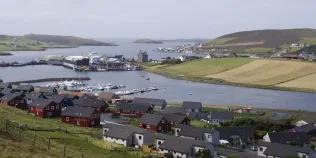Researchers from the Viking Genes research project identified 108 genetic variants – differences in a person’s DNA – in 23 genes, which can be linked to conditions like cancer and heart disease.
These results were then communicated to participants, giving them the opportunity to undertake personalised treatment for their condition.
Experts say it is one of the UK's first extensive efforts in returning clinically actionable genetic results to people involved in the study.
Targeted screening
After receiving a letter advising him of a variant in the BRCA2 gene, one volunteer underwent tests that showed he had prostate cancer. He underwent a successful operation in February to remove his prostate and is already back at work on his fishing boat.
The research also revealed that 10 of these disease-causing variants were much more common in either Orkney or Shetland than elsewhere in the UK.
Experts say the findings demonstrate the power of targeted genetic screening to help improve the health of people from isolated communities.
Genomic results
Viking Genes, led by experts at the University of Edinburgh, is investigating the genetics and health of volunteers with at least two grandparents from the Hebrides, Shetland or Orkney.
In this latest study, researchers analysed the genetic data of 4,198 participants and found small differences known to affect health in about 2.5 per cent of them.
NHS Grampian clinical genetics services verified the findings before 64 consenting participants were notified about their results, with experts adhering to recently introduced international guidelines developed by the American College of Medical Genetics and Genomics for returning genomic results.
The study, which involved researchers the University of Aberdeen and the Regeneron Genetics Center, is published in the American Journal of Human Genetics and was funded by the Medical Research Council. The letters were funded by a Wellcome Trust Institutional Translational Partnership Award (iTPA), through the iTPA team at Edinburgh Innovations.


